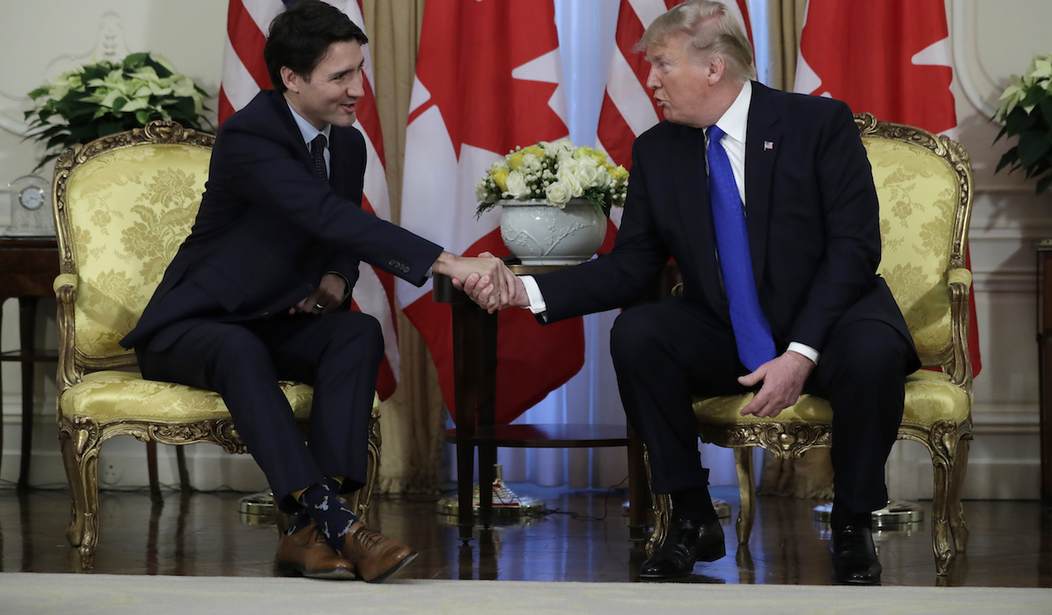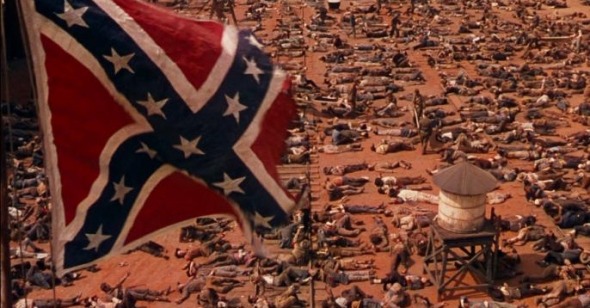
So Donald Trump has trolled Justin Trudeau, suggesting to the Canadian PM that his country become America's 51st state, one which he in turn could become the governor of.
Excluding more expansionist rhetoric, regarding Greenland and the Panama Canal (and as the Washington Free Beacon declares its 2024 Man of the year to be the Conservative Party's Pierre Poilievre (thanks to Instapundit's Ed Driscoll, eh?)), the thing about Canada is that it is a (con)federation of 10 sub-units (called provinces) in the same way that the U.S.A. is a (con)federation of 50 sub-units (called states).
 |
| An Old Glory with extra stars — via AI Magic Media |
There is much thought to be given to the matter.
I actually gave it some thought decades ago, right after college, when I tried imagining what the new American flag might look like: should the Stars and Stripes be 60 stars or — what follows I knew was far-fetched — 50 stars plus 10 star-sized maple leafs on the bottom line of the canton?
It has been common throughout history to talk about Britain's 13 colonies in America, and all of said colonies uniting to become independent. This ignores that George III actually had 15 colonies in all, the 13 below the Saint Lawrence River, plus two above, then called Upper Canada and Lower Canada. The latter admittedly had a very different history, the former Nouvelle France being a conquered territory (and a conquered foreign people with a different language) by Britain a decade prior to the unrest further South. Being former subjects of the French Crown, why did Québec not join the 13, then? Should they not have the most fervent of les Américains resisting the hated roi des Anglais?
Many history scholars and teachers whom I asked this question to hummed and hawed. appearing to never have given a thought to the matter. The answer, I eventually fount out, were that the Québecois were Catholics and apparently, they trusted more in their British overlords than in the mainly Protestant radicals and hotheads of the lower colonies.
I wondered how history had been different had the 1775 invasion of Québec been successful, or had Britain's 14th and 15th colonies agreed to join the continental congresses in the early 1770s and agreed to provide a single united North American continent (down to Spain's Mexico border, anyway). How would the first half of the 19th century been different? Would the Civil War "four score and [about] seven years" years later — had it erupted at all — have been shorter, had the president (Abraham Lincoln or another commander-in-chief?) not needed to worry about an invasion from Queen Victoria's British America?
(An aside from down South: after the Mexican War, the U.S. annexed more than half of Mexico; however, there were plans in 1847 and 1848 to annex even more territory, with not the Rio Grande river serving as the U.S./(rump) Mexican border but the Sierra Madre mountain range. Anyway, the full name of the country is the Estados Unidos Mexicanos and if the 31 United Mexican States (plus the DF equivalent of DC) were also to join the US of A, it might lead to 81 stars on Old Glory, or along with Canada's provinces, 91.)
Population & Area
If Canada were to join as a single state, it would be far from a pushover; its 41 million inhabitants would surpass California's 38,000,000 as the most populous state of the (enlarged) Union. It would also — easily — become the largest state by area. Indeed, as the second-largest country on the planet by total area, the Great White North joining the U.S. would make the enlarged union jump to largest country on Earth, with its total 7.39 million square miles (19.3 million square km) surpassing Russia's 6.6 million square miles (17,000,000 square km).
Reminder: back in 1960, when Alaska became the largest state in the Union, some of The Last Frontier's inhabitants enjoyed provoking the previous largest state, Texas, telling its (very) proud citizens that their state (Alaska) was so much larger that they could split it it in two, making the Lone Star State only the third largest in the Union. By comparison, Canada might split into five, making Alaska the sixth-largest state and putting the proud Texans into (a humiliating?) 7th place.But the fantasy of splitting Canada into five does not take into consideration that — as mentioned — the country is already split into 10 provinces — not to mention three territories.
Danger: Leftists Galore
The danger of having/asking/requesting (?) the 10 provinces join is that the second-most populous province (among others?) might not want to join at all. There are fewer more anti-American people on this planet than the Quebécois, proud to the Heavens of their French language and heritage, going so far as regularly lecturing the French population on the matter.
Having worked for the Québec government in a Dallas office as my first summer job — it was a standing requirement that the name of the province always be written with its French accent, whatever the language (English or other) it was written in (as you can see in this very post). With support from France, sometimes — notably when Charles de Gaulle shouted "Vive le Québec libre!" during his 1967 tour, leading him to cut his state visit short — the Québecois regularly hold referendums about splitting from the rest of English-speaking Canada and becoming independent.
The danger of having Canada join at all, whether as one or as 10 (9?) sub-units, is the leftist mentality that dominates (the media being worse than America's, as observed, say, during the truckers' Covid revolt).
Twenty years ago, indeed, the Canadian sanctimocracy ("rule by the holier-than-thou") was described during the Iraq War as a nation crippled by a dishonest pacifism, while No Pasarán quoted the International Herald Tribune as saying that Because
Canadian Mentality Is Closer to That in Europe, They Are More Generous
and More Security-Conscious than Dollar-Hungry American Capitalists Are.
The following year, in March 2005, one Michael Coren wrote in the Toronto Sun that it pained him to say it, but
I'm so very tired of the way … that we Canadians have come to define ourselves not by who we are but by who we are not. … With a malodorous stew of ignorance and malice, [publicly funded mediocrities screaming abuse at a great and noble nation] pump Canada at the expense of deflating the United States"
The writer's mailbox was soon overflowing, with 1,000 letters from Canadians of
all backgrounds and ages. To Coren's delight, over 90% "wrote to say that I had spoken for
them."
Unsurprisingly, the remainder, filled with insults such as "collaborationist, double-crossing fifth columnist, fraternizer, quisling, saboteur, security risk, subversive traitor, treasonous turncoat, two-timing quisling", only served to prove… exactly what Coren had written the previous week, "deliciously [illustrating] Canadian hypocrisy and self-delusion":
We flatter ourselves into a false sense of grandeur by flippant assumptions of our own tolerance and liberalism.
… Goodness me, I'm as bad as the Norwegian fascist who sold his country to the Nazis because I wrote that the United States is not the ugly bully so many Canadians make it out to be.
… Conclusion? The chauvinistic neurosis of the Canadian liberal is in many ways even more repugnant than the insularity of some Americans.
Back to the 2024 meeting at Mar-a-Largo: PJMedia's Robert Spencer mentions that
Someone at the meeting, according to Fox News, then warned Trump that as a state, Canada would be deep blue, whereupon Trump suggested it become two states, a leftist one and a patriotic one.
So, according to Donald Trump, that makes neither 51 nor 60 (59?), but a total of 52.









